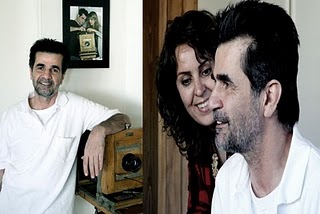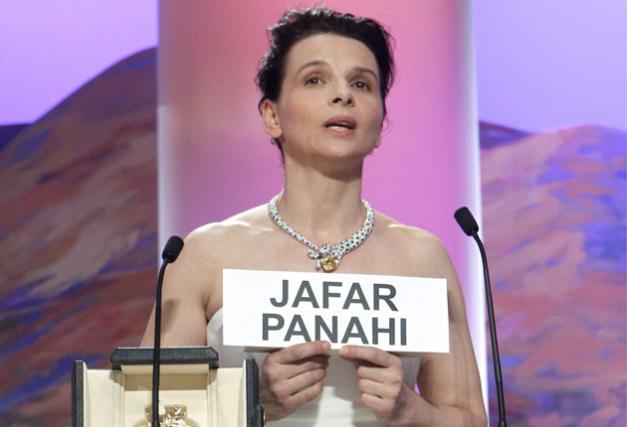The Latest from Iran (25 May): Panahi Freed; Will There Be a 12 June Protest?
 Tuesday, May 25, 2010 at 8:45
Tuesday, May 25, 2010 at 8:45 
1435 GMT: A Government of Fake Doctors? According to Tabnak, Kamran Daneshjoo, the Minister of Science and Higher Education, has said that 1st Vice President Mohammad Reza Rahimi's claim of a Ph.D. is false.
Ironically, Daneshjoo has also been accused of presenting incorrect information that he has a doctorate from a British university.
NEW Iran Analysis: Towards the Final Battle? (Zahra)
Iran Document: The Mousavi-Karroubi Meeting (23 May)
Latest Iran Video: Ahmadinejad Heckled During Speech (24 Ma
The Latest from Iran (24 May): Rahnavard’s Statement, Ahmadinejad Heckled
1420 GMT: Panahi is Free. Tahareh Saeedi has told Agence France Presse that her husband, film director Jafar Panahi, is out of Evin Prison (see 1145 GMT): "Yes, he has been freed. He is fine. We are taking him to the doctor...[who will] prescribe a diet [for him]."
1335 GMT: Rahnavard on Resistance. Zahra Rahnavard, activist and wife of Mir Hossein Mousavi, has posted another statement on her Facebook site: "Women Will Resist Until Their Demands Are Fulfilled".
1145 GMT: Political Prisoner Watch. After 24 hours of uncertainty (see 0735 GMT), film director Jafar Panahi has been released from Evin Prison on $200,000 bail.
0945 GMT: Government Not Worried at All. Really. Which is why Tehran police chief Hossein Sajedi has declared that security forces will put down any protests on 12 June, the anniversary of the 2009 election: "Police will confront any illegal gatherings ... police are vigilant and in charge of public order and security."
0815 GMT: A Promise to March? Peyke Iran claims that youths leaving a football match in Tehran's Azadi Stadium shouted a message for President Ahmadinejad: "Football is a pretence/Khordaad will be an uproar".
0810 GMT: Assault. Rah-e-Sabz claims that reformist politician Ali Shakouri-Rad was attacked and insulted by Basiji students after his lecture at Elm-o-Sanat University in Tehran.
0800 GMT: Political Prisoner Watch. Daneshjoo News has posted a list of more than 80 imprisoned students.
Journalist and human rights activist Kaveh Ghasemi Kermanshahi, released on Sunday on bail after more than 100 days in detention, has spoken to Rooz Online about prison conditions and his hunger strike.
RAHANA reports that Kurdish artist Mokhtar Houshmand was arrested at his home on Sunday.
0745 GMT: The Revolutionary Guard and Oil. Peyke Iran claims that the sell-off of Iranian resources to the Islamic Revolution Guards Corps continues. The IRGC has allegedly acquired several large projects in the South Pars oil and gas fields, pipelines, and the Ilam refinery.
Meanwhile Rahmani Fazli, chief of Iran's audit office, says that daily oil production must rise to 7 million barrels per day for the Government's 5th Plan to be feasible. Current production is 3,9 million barrel per day.
0735 GMT: Waiting For/Protesting About Panahi. Still no confirmation that film director Jafar Panahi has been freed from Evin Prison, despite the assurance of the Tehran Prosecutor General that the Iranian bureaucracy is processing the release on bail.
Meanwhile Juliette Binoche, winning Best Actress at the Cannes Film Festival for her role in Abbas Kiarostami's A Certified Copy, makes a simple statement:

0655 GMT: Culture Wars. In her analysis this morning, Ms Zahra notes sharply, "Even a “cultural” step such as using hijab as a new cause for oppression attests to the weakness of this regime."
Radio Free Europe/Radio Liberty has a complementary article, "Iran has launched a new drive to enforce the obligatory Islamic hijab. Hijab and women who are considered as being badly or improperly veiled and their alleged threat to society is again among the main themes of speeches and comments by Friday Prayer leaders and other state officials."
Most striking, however, is not the summary of the state's intimidation but the snapshot of reaction from Iranian women. While most in a recent report on Iranian television supported the hijab, the video also had this vignette:
At the beginning the reporter interviews two women considered "badly veiled" who seem to be opposed to the enforcement of the dress code. Such women are usually never given a platform on state television.
The first woman says she dresses the way she wants. "I think that's more important than what others might think about how I dress," she says.
The second woman, whose face is blurred like the first (apparently because they didn't want to be identified), makes similar comments. "I wear what I want and I don't listen to what others say," she says.
0645 GMT: Power and Resistance. Looking at but going beyond 22 Khordaad (12 June), we have a special analysis from Ms Zahra, assessing the political situation and asking if a "final battle" is looming for the Government.
Meanwhile, a single incident has sparked attention from the global media to internal developments in Iran: the video of workers heckling President Ahmadinejad, during his speech in Khorramshahr yesterday, has been picked up by most international broadcasters and websites.
0630 GMT: We open this morning with continued discussion of the significance and even the exact wording of the statement from the meeting between Mir Hossein Mousavi and Mehdi Karroubi on Sunday. My initial reading of their declaration, as translated and posted by the Facebook page supporting Mousavi, was that the two men had set down a limit: they were calling on the Green Movement to march if a permit was granted but, if it was denied they would not take to the streets but would seek to extend awareness and present demands in other ways.
An EA correspondent put the emphasis on those "other ways": "[Mousavi and Karroubi] will not stand idle if, as expected, the permission is not granted." Then a reader brought out this information:
A friend in Tehran...tells me that what the original article in Farsi, on Kaleme.com, says is that if the permit is not given, then instructions for the march will be disseminated via Twitter, Facebooks, SMS, etc., not that the rally/march/demo will not be held. On the contrary...both Mousavi and Karroubi state that the demonstration will be held regardless.
So more watching and listening for signals today. What may be significant, while we're looking for resolution, is that there is even a discussion of how far the opposition will go on 12 June.
That is not a discussion that you have if the Green Movement is dead or dying....
 Abbas Kiarostami,
Abbas Kiarostami,  Agence France Presse,
Agence France Presse,  Ali Shakouri-Rad,
Ali Shakouri-Rad,  Daneshjoo News,
Daneshjoo News,  Green Movement,
Green Movement,  Hijab,
Hijab,  Hossein Sajedi,
Hossein Sajedi,  Iran,
Iran,  Iran Elections 2009,
Iran Elections 2009,  Islamic Revolution Guards Corps,
Islamic Revolution Guards Corps,  Jafar Panahi,
Jafar Panahi,  Juliette Binoche,
Juliette Binoche,  Kamran Daneshjoo,
Kamran Daneshjoo,  Kaveh Ghasemi Kermanshahi,
Kaveh Ghasemi Kermanshahi,  Mahmoud Ahmadinejad,
Mahmoud Ahmadinejad,  Mehdi Karroubi,
Mehdi Karroubi,  Mir Hossein Mousavi,
Mir Hossein Mousavi,  Mohammad Reza Rahimi,
Mohammad Reza Rahimi,  Mokhtar Houshmand,
Mokhtar Houshmand,  RAHANA,
RAHANA,  Radio Free Europe,
Radio Free Europe,  Radio Liberty,
Radio Liberty,  Rah-e-Sabz,
Rah-e-Sabz,  Rahmani Fazli,
Rahmani Fazli,  Rooz Online,
Rooz Online,  Tabnak,
Tabnak,  Tahareh Saeedi,
Tahareh Saeedi,  Zahra Rahnavard in
Zahra Rahnavard in  Middle East & Iran
Middle East & Iran 
